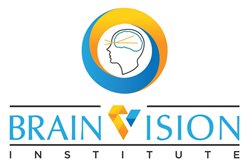
Whether you’re an athlete, a weekend warrior, or just someone who loves staying active, a concussion can turn your world upside down—literally. Beyond the headaches and dizziness, many people don’t realize that concussions can also affect vision, making everyday tasks like reading, driving, or even walking feel disorienting. Many people don’t realize that symptoms of these injuries can linger long after the initial injury. Fortunately, specialized vision therapy can help.
With the right care and targeted exercises, you can retrain your brain and eyes to work together again, restoring clarity, balance, and confidence. Below, our South Barrington eye care team at Brain Vision Institute explores how post-concussion vision therapy can be the key to a full recovery.
Understanding the Impact of Concussions on Vision
Sports injuries, particularly concussions, can have profound effects on vision. While most people associate concussions with headaches, dizziness, and memory loss, they often overlook the significant impact these injuries can have on eye function. The brain and eyes work closely together, meaning that any disruption from a head injury can cause visual disturbances such as:
- Blurred or double vision
- Difficulty tracking moving objects
- Sensitivity to light
- Trouble with depth perception
- Eye strain and fatigue
- Headaches triggered by visual tasks
For athletes and active individuals, these issues can make daily activities—and even returning to their sport—challenging. Without proper intervention, post-concussion vision problems can persist for months or even years.
How Vision Therapy Supports Recovery
Standard concussion recovery often includes rest, physical therapy, and cognitive rehabilitation. Where your vision and eye health are concerned, vision therapy can play a crucial role.
Vision therapy is a structured, customized treatment program designed to retrain the brain and eyes to work together efficiently. It involves targeted exercises and activities that improve eye coordination, focusing ability, and visual processing speed.
Key components of vision therapy for post-concussion recovery include:
- Eye Tracking Exercises: Enhancing the ability to follow moving objects smoothly
- Focus Training: Strengthening the eyes’ ability to shift between near and far objects
- Depth Perception Exercises: Improving spatial awareness and balance
- Light Sensitivity Management: Reducing discomfort in bright environments
- Peripheral Vision Expansion: Enhancing awareness of surroundings for better reaction times
Returning to Sports After a Concussion
One of the biggest concerns for athletes recovering from a concussion is knowing when it’s safe to return to their sport. Coming back too early before being fully recovered can significantly increase the risk of another injury. Poor vision can affect reaction time, depth perception, and overall coordination— all critical skills for peak sports performance and preventing another injury.
By including vision therapy as part of their recovery, athletes can regain the necessary visual skills to perform at their best. Whether it’s tracking a ball, maintaining balance on the field, or reacting quickly to a play, clear and efficient vision is essential for peak performance and safety.
Get the Right Care for Post-Concussion Vision Issues
If you or a loved one has experienced a concussion and is struggling with vision-related symptoms, don’t wait for the issues to resolve on their own. Post-concussion vision therapy can make a significant difference in recovery, helping restore clarity, comfort, and confidence.
At Brain Vision Institute, we specialize in neuro-optometric rehabilitation to help patients recover from sports-related injuries and concussions. Our customized therapy programs are designed to retrain the brain and restore essential visual skills. Contact us today to learn more about how we can support your recovery.

*Open Saturday by appointment only.